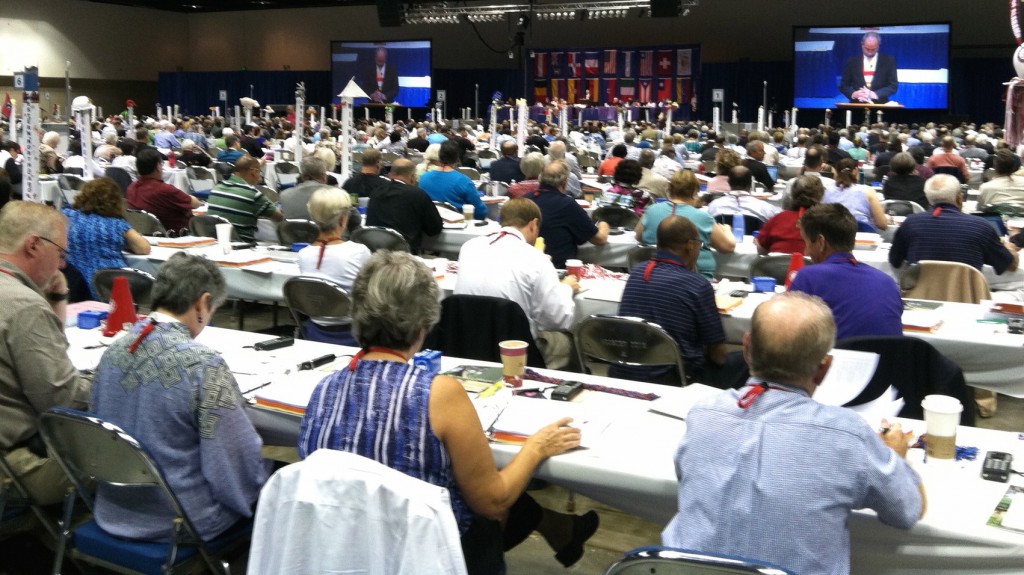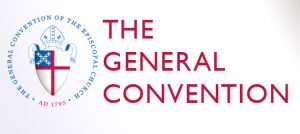Deputies and Bishops will begin traveling toward Austin and the 79th General Convention over the next several days. During the Convention, they will be considering a number of resolutions on the life and work of the Church, many of which address how it does business both within its own “walls” and out in the world. Some of the items which seem primed to cause a great deal of conversation include proposals to begin the process of revising the Prayer Book and Hymnal; addressing the epidemic of sexual harassment within the Church; and access to marriage rites for all.
From the report of the Standing Commission on Liturgy and Music, which is available for download on the General Convention’s Blue Book page, regarding Hymnal revision:
“In response to Resolution 2015-D060, directing the Standing Commission on Liturgy and Music to devise a process for the revision of the hymnal, the SCLM declined to act. Our research determined no historical precedent in the Episcopal Church for a hymnal to be revised prior to the Book of Common Prayer. The SCLM would like General Convention to make decisions regarding whether or not to revise the 1979 Book of Common Prayer before any further decisions are made regarding revision of the Hymnal 1982.
“In addition, after reviewing The Hymnal Revision Feasibility Study produced by the Church Pension Group we discerned no widespread interest in revision.”
From the same report, regarding Prayer Book revision:
“… We combined four options into two options — a combination of (1) and (2), and a combination of (3) and (4). Essentially, Option One (1+2) envisions a decision by the upcoming General Convention to move into the revision process immediately, the first stage being to gather data, resources, and ideas, and then set up the structure to begin drafting immediately after 2021 General Convention. Option Two (3+4) envisions a slower pace, while remaining open to Prayer Book revision in the future. Option Two invites the whole church to broaden its familiarity with the 1979 Prayer Book and the history that underlies it, and provides for time to reflect as a body on the significance of common prayer in our tradition. These are the two options the SCLM is presenting to the 79th General Convention, culminating in two resolutions. The SCLM asks General Convention to choose an option and appropriate full funding for that option. The extensive background materials section is intended to support and equip General Convention to discern our collective path forward, to consider every possible angle in order to discern what is best for our church and to what God is calling us in this moment. Our report is intended to move our church toward unity through a process of collective discernment rather than to cause divisiveness by attempting to assert personal piety and individual liturgical preferences over that of others.”
As outlined in a press release from the Diocese of Long Island, the bishops of Long Island, Rhode Island, and Pittsburgh are proposing a way forward on marriage rites:
“The resolution seeks to ensure that all of God’s people have access to all the marriage liturgies of the church, regardless of diocese, while respecting the pastoral direction and conscience of the local bishop. Resolution B012 continues to authorize the two Trial Use Marriage Rites first authorized in 2015 without time limit and without seeking a revision of the 1979 Book of Common Prayer.
“Given our particular time in history, this resolution provides a way forward for the whole church without the possible disruption of ministry that might be caused by the proposed revision of the Book of Common Prayer.”
The full text of B012 can be found here.
And last, but certainly not least, the full report of the House of Deputies Special Committee on Sexual Harassment and Exploitation was also released earlier this week. As ENS reported on June 27, the resolutions offered by the committee,
“… focus on inclusive theology and language; disparities in pay, hiring, leave and pensions; changes to the Title IV disciplinary process and training; truth and reconciliation; and systemic social justice beyond the church. [The Rev. Gay] Jennings, who chaired the committee, told Episcopal News Service via email that the committee has, ‘worked efficiently, collaboratively and creatively to draft an impressive array of legislation.’ The Rev. Ruth Meyers, an alternate deputy in the Diocese of California, was vice-chair of the committee, and Jennings said she, ‘led an enormous amount of work on a tight timeline.” Jennings said she is grateful to Meyers and to, ‘all of the women whose efforts are leading the Episcopal Church to confess our sins of gender-based discrimination, harassment and violence against women and girls and to end the systemic sexism, misogyny and misuse of power that plague the church and the culture.’”
(A note on resolution numbering: The letter at the beginning of each resolution’s title designates the originating source of a resolution. “A” resolutions are proposed by standing committees and commissions, such as the Standing Commission on Liturgy and Music; “B” resolutions are proposed by bishops; “C” resolutions are proposed by dioceses; and “D” resolutions are proposed by members of the House of Deputies.)
One can follow the progress of all current legislation on the Virtual Binder page.


